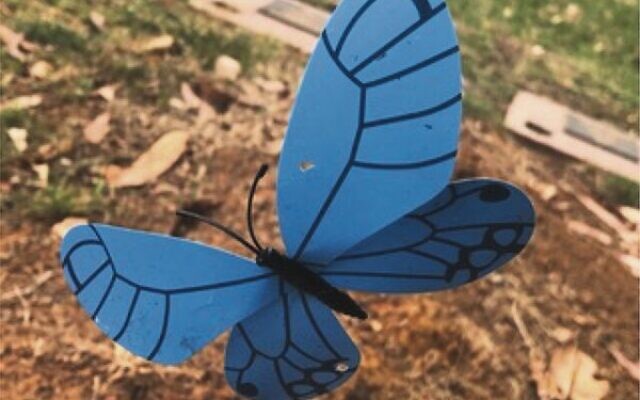‘Sitting at my baby’s grave, my mind turns to Auschwitz’
"Losing track of time, immersed in my thoughts, sitting, still on my son's grave, my mind returns to Auschwitz, and International Holocaust Remembrance Day, commemorated on the same day as liberation."
Auschwitz was liberated 77 years ago on January 27, 1945. My son was born 35 years ago on January 15. Seemingly, totally unrelated dates. But not to me. Since the moment my son died at six days I’ve been trying to make sense of his achingly short life. Buried with his Bobbe and Zeyde who never got to meet their grandson, in the tranquil Jewish Memorial Garden at Springvale Cemetery, they lie, united in death, just metres from rows of graves of other babies, each with its own heart-wrenching story to tell.
As I’ve sat on my son’s grave on birthdays, yahrzeits or just any time over the past decades, I’ve relived the events of his brief life, and tried to grasp how the birth of a baby, normally such a huge naches to be celebrated by all, could turn out to be such an overwhelming nightmare.
Inevitably, my mind turns, as it does when I’m searching for answers, to Holocaust survivors. I remember my lack of comprehension too on walking the bloodstained earth of Auschwitz, trying to make sense of something that has no sense. Trying to grasp the sheer numbers: of some 3000 babies who were actually born in Auschwitz – delivered by Stanisława Leszczyska, Polish Catholic midwife and fellow prisoner – I learned about half of them were drowned, approximately 1000 died soon after birth of cold or starvation, with as few as 30 miraculously surviving.
My thoughts return to my son’s life and amidst the memories of shock, crushing sadness, desperation and grief are memories, just as indelible of care, support, strength, endeavour and love. I remind myself that he was cocooned, adored and surrounded by family willing him to live, and medical professionals desperately trying to save his precious life – to enable him to leave the intensive care nursery a strong and healthy baby boy.
He was gifted teddy bears that looked over him as he fought for every breath. He wore tiny woollen caps, knitted by volunteers, to prevent the heat from escaping his body. He gripped our fingers with tenacity as if to ask us not to leave him. He’d been delivered in an operating theatre under bright lights, but he died in the loving arms of his mother.
Losing track of time, immersed in my thoughts, sitting, still on my son’s grave, my mind returns to Auschwitz, and International Holocaust Remembrance Day, commemorated on the same day as liberation. It’s the mothers I think of, on this day in particular, the mothers who survived, but whose babies didn’t. Again I search for comprehension. How could any mother survive a hell beyond words and go on living? And not just go on living, but like so many Shoah survivors, embrace life and find joy again.
As difficult as I find it to sit on my son’s grave, there is a knowing within of how fortunate I am to have this memorial to his life and death. As excruciating as it is to confront, I too have an album of photos that document his birth, his six days on this earth and his death.
I have his lemon caps and bed sheets that have never been washed and, perhaps only in my imagination, still hold remnants of his unique baby smell.
I have his teddy bears and other gifts that were awaiting his arrival home. I have the banner announcing: “It’s a Boy” sent by my cousin, overseas at the time.
Most importantly perhaps, I have people in my life who loved him and remember him. My twin sister had only ever wanted to take him to feed the ducks in her beloved gardens, and to this day expresses deep sorrow that it never could be.
I try to imagine again, the depravity that instead was the reality for those 3000 mothers who gave birth in Auschwitz. Were their babies immediately ripped from their arms, or did they even get to hold them? I like to think they could share even a moment of peace with their newborns, with the help of the caring midwife who risked her own life to help them. Did they know their babies were to be taken to certain death or did they hold a sliver of hope that it could be otherwise? After liberation could they ever be truly free? Free from the longing for a missing child – a grief that lasts a lifetime that only a mother could know.
I want to thank those mothers of Auschwitz, and especially the ones like me who remained mothers without children, for giving me answers when there are none. Simply for demonstrating it is possible to live your life fully, both for yourself and for your child who was denied the chance.
As I leave my son’s grave, a toy butterfly catches my eye – placed carefully on a baby’s grave. I know there were birds at Auschwitz – they can be seen in gruelling footage, flying above the barbed wire.
I wonder if there was also the occasional butterfly; symbolising spiritual rebirth, transformation, hope and life.
Janine Joseph is a Melbourne writer.


comments